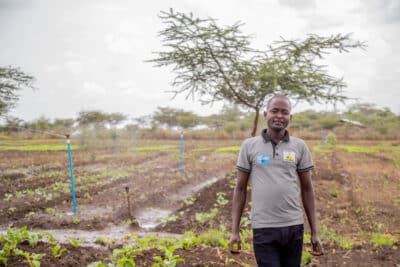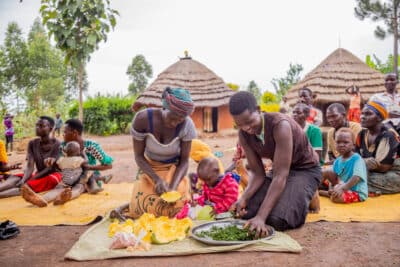News
19 November 2011
Farm Africa transforming lives in Western Kenya through improved cassava

On a recent visit to Western Kenya, Farm Africa saw just what a difference its Cassava Project is making in transforming the lives of farmers in the region.
Farm Africa travelled to Western Kenya with a team of representatives from the National Farmers Union (NFU). The NFU is supporting the Cassava Project through its Africa 100 Appeal, launched to celebrate the NFU’s centenary year.
New Cassava at a glance
- Improved cassava varieties mature in just 9-12 months whereas local cassava varieties can take up to two years to mature
- New cassava is resistant to disease such as the Mosaic virus which results in diseased plants, smaller tubers and smaller harvests
- New cassava produces larger tubers than old cassava, and more of them – sometimes up to 30 per plant.
The project’s central aim is to resuscitate traditional farming of the local staple crop cassava after it was recently blighted by the devastating Mosaic virus. (The disease was especially serious because the adverse effects it had on the variety of cassava traditionally grown in the area meant that the crop could no longer be grown on an economically sustainable basis by local farmers.)
Farm Africa is enabling farmers in the region to recover from the disease by introducing them to new and improved varieties of cassava. The improved variety is designed both to resist disease and to withstand the drought-like conditions which are increasingly affecting Western Kenya.
The new varieties also mature far more quickly than traditional varieties, enabling farmers to grow more. This in turn creates surpluses of the crop which farmers can sell at market to earn much needed additional income for their families. This additional income has a real and lasting impact on farmers’ families: it is used to pay for medical expenses and to clothe and feed their children, as well as to improve overall living conditions.
Farm Africa and the NFU visited a large number of households throughout Ugenya and Nyanza districts during their visit. Wherever they went, the NFU team was able to see how the Farm Africa project was convincing farmers to change over to the new cassava varieties: plots where the new seed variety had been planted were set alongside plots where the local, more traditional cassava was being grown. The difference made by the new varieties in growing larger, healthier and faster-maturing cassava was plain for farmers to see; and demand for the new seeds was unsurprisingly high.
Farm Africa is also creating demand for the new cassava varieties by demonstrating how the value of this basic staple can be increased by using it to as the basis for a wide variety of appetising new meals, including chips, crisps and cake as well as traditional favourites such as chapattis, stews and flour.
It was obvious, wherever the team went, that the new cassava was transforming and improving people’s lives. The experiences of these two individual farmers is typical of what is happening throughout the project area.
%module-embedded-3%
Woman explains how the improved cassava variety has transformed her life, enabling her to grow more food for her family to eat and to earn additional income for improving her family’s living conditions.
Michael Obiero
Michael contracted polio as a child which left him permanently unable to walk. Despite this disability, Michael is now a beacon farmer for the Africa 100 Cassava Project – thanks to his early championing of the new cassava varieties provided by Farm Africa.
Michael lives in Kochogo, about an hour’s drive from Kisumu in Nyanza district. He was quick to realise how the new cassava would help save his family and community from starvation as a result of increasing drought. His hard work and dedication has resulted in his farm becoming a great cassava success story. Looked up to as a leader among his community, Michael has inspired the work of the Kamicha farming group which now includes 35 households which are growing cassava.
Chairperson of the group, Charles Ouma, said:
“The NFU and Farm Africa have helped Michael to be where he is today. He is an innovator. Members of the group all wanted to come and meet you. They have seen the results of growing the new cassava and they want it to spread.”
Michael is determined to widen take up of the new cassava varieties, and its benefits, as far as he can. Local farmers have set up a demonstration plot where, besides learning about the new cassava, students can also learn other innovative technologies, including silaging, planting and harvesting.
John Yugi
John is a farmer from Kochogo. He has previously grown maize and, before that, sugar cane. He has recently seen harvests for both crops fail but his life was transformed after he attended a meeting given by Farm Africa’s local partners. At the meeting he learned about new varieties of cassava and – crucially – techniques for planting it.
The results are astonishing: he now has enough food to feed his family with a surplus to sell at local markets for additional income. The crop only requires three weedings per season and needs no inputs to ensure effective growth.
Whereas one acre of maize would typically earn John around 5400 Kenyan shillings or around £30, the same acre of cassava earns him 50,000 Kenyan shillings or £320.
John says: “I used to struggle to grow maize which meant I struggled to pay for my children to go to school. Now I can pay for their school fees, I can buy them the books and the uniforms they need.”




